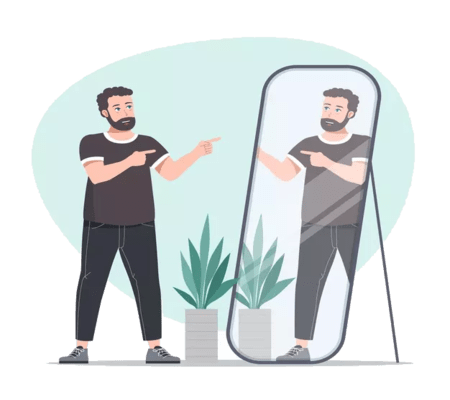Online Self-Esteem Therapy | Best Therapist For Self-Esteem Help
- Set up a free & confidential chat on your Self-esteem issues
- Unlimited help through Self-esteem self-care app
- Live Video or Chat sessions with top Self-esteem therapists
Begin Therapy
Consult online with best Therapist
Get The Best Help For Self-Esteem
Therapy Mantra is here to help you on your path to recovery from Self-esteem. We match you with the best Self-esteem therapists available 24/7 via video call or messages.
Match with Self-esteem Therapists
We assign the best counselors experienced in Self-esteem issues based on your needs.
Affordable and Effective
Our online sessions are 90% less expensive than in-person therapy, available 24/7.
Self-Care for Self-esteem
We offer ongoing Self-esteem support through self-care tools, Self-esteem help videos, chat groups, meditations, breathing exercises, and other resources.

Wondering if it’s just a phase or something more? Take our Free online Self-esteem test to find out?
How it works?
You are matched with a Self-esteem counselor based on your needs and preferences. You get a secure “therapy room” where you can communicate with your counselor via chat or phone. You can write or talk about Self-esteem & ask questions to deal with Self-esteem.

Register for Self-esteem Counseling
Simply complete a 5-minute online form to tell us about your Self-esteem issues

Consult with your Self-esteem Therapist
We connect you with Self-esteem counselors who are available 24/7 based on your preferences and needs.

Connect to Our App
Apart from Video/chat sessions, our app offers self-care tools, videos, and meditations to help you deal with your Self-esteem.
Best Self-Esteem Therapists
Positive conversations, exercises, and meditations are used by Therapy Mantra psychologists to help you deal with Self-esteem. Our Self-esteem therapists outperform traditional counseling as you get matched from a pool of 500+ Self-esteem counselors, who offer 24/7 unrestricted private chat.








What Is Self-Esteem?
The definition of self-esteem is the value or worth one feels for oneself. It can be positive, negative, or neutral feelings towards the self. An individual’s level of confidence in their own accomplishments and abilities affects their perception of themselves. A person with high self-esteem has an optimistic attitude about themselves while someone who lacks this may have low levels that could suppress them socially and emotionally.
Self-esteem is not something that you are born with, but rather it’s learned. As children grow up their sense of self-esteem is developed based on the feedback they get from parents and other people in their lives. This can be positive or negative reinforcement about what they do such as if a kid gets rewarded for good behavior by receiving praise.
Types of Self-Esteem
There are different types of self-esteem: unconditional, conditional, and fragile.
- Unconditional self-esteem is when a person has high levels of positive feelings about themselves regardless of whether they’ve experienced failure or success in life. People with this type feel confident that their personality traits will not be changed by the outcome of certain situations such as winning or losing money playing games.
- Conditional self-esteem is based on someone’s personal accomplishments and abilities along with how others perceive them to be successful. If an individual does well at something like school then they gain confidence but if things don’t go so well for them it decreases their sense of worthiness which can lead to low self-esteem over time.
- Fragile self-esteem is the opposite where people lack faith in their abilities and their worthiness. This can result in people feeling very insecure and having doubts about themselves which can then lead to anxiety or depression.
How Does Therapy Help With Self-Esteem?
Therapy can be an extremely effective way to work on your self-esteem. During therapy, you’ll have a safe place to explore the thoughts and feelings that are impacting your esteem. You’ll also learn new skills and strategies for improving how you feel about yourself.
Therapies are very beneficial for people with low or excessive self-esteem because they help you understand your feelings and learn constructive ways of dealing with them. They also teach you skills that can be used outside of therapy, like goal setting, communication techniques, and conflict resolution.
Therapy Treatments For Self-Esteem
There are many types of therapies that can be helpful for improving self-esteem. Some of the most common therapies include:
Cognitive Behavioral Therapy (CBT)
CBT is a therapy used to treat a wide range of issues, including low self-esteem. It can be helpful because it teaches you how your thoughts and feelings affect each other as well as the impact they have on your behavior. By changing negative or inaccurate beliefs about yourself, CBT can help improve both your esteem and mood.
Individual Therapy
One-on-one therapy is used to address specific concerns related to self-esteem, like interpersonal relationships or setting goals for improvement. Because there’s only one person in the session at a time, individual sessions are especially beneficial for people who struggle with social anxiety or meeting new people. You’ll also get support from having another person present during the session who wants what’s best for you rather than being part of an anonymous group.
Group Therapy
Group therapy is a type of therapy where you meet with a group of people who share similar concerns or experiences. This can be beneficial because it allows you to connect with others who understand what you’re going through and gives you the opportunity to share your thoughts and feelings without feeling judged. Group therapy can also provide support and practical advice from the other participants.
Interpersonal Psychotherapy (IPT)
IPT is a type of therapy that helps you explore the relationships in your life and how they’re impacting your self-esteem. It can be helpful for people who have difficulty trusting others or feel like they’re not good enough. IPT can also help you learn how to communicate better and resolve conflicts in your relationships.
Art Therapy
Art therapy is a type of therapy that uses creative outlets like painting, drawing, and sculpting to help improve self-esteem. It can be beneficial because it allows you to express yourself in a nonverbal way and connect with your inner thoughts and feelings. Art therapy can also provide insight into your life that you may not have otherwise realized.
Nature Therapy
Nature therapy, sometimes known as ecotherapy, is the use of nature to facilitate healing. This can include activities like hiking, camping, gardening, or simply spending time in a natural environment. Nature therapy is an especially good option for people who live in urban areas and don’t have access to nature or peaceful settings. This type of therapy can help improve self-esteem by promoting relaxation, encouraging connection with the outdoors, and inspiring creativity through art projects or journaling experiences from your time outside.
How To Find a Self-Esteem Therapist?
Therapy Mantra can help you find a self-esteem therapist near you. We have over 500+ therapists listed on our therapist directory. You can follow the following steps to find a good self-esteem therapist:
- First, ask your family doctor or anyone else you are seeing for a referral for a self-esteem therapist.
- The next thing you’ll want to do is ask your friends and loved ones for referrals.
- The next thing you’ll want to do is look online. There are many websites that help people find therapists in their area who can treat things like self-esteem
10,000+ Happy & Healed Self-Esteem patients

“After years of dealing with self-esteem issues, Therapy Mantra assisted me in releasing a lot of buried emotions. I had previously received self-esteem counseling, which helped, but Therapy Mantra was able to turn me around and make me look forward to a better life.”
Kevin,
1 year on TherapyMantra
FAQs
Self-esteem refers to how you feel about yourself and your abilities. It’s a combination of your thoughts, feelings, and opinions about yourself.
If you have low self-esteem, you’ll likely feel like you’re not good enough or aren’t worthy of happiness or success. You may also struggle with social anxiety, perfectionism, or feeling like you always have to be in control.
Yes, it’s possible to have too much self-esteem. People who have excessive self-esteem often think very highly of themselves and have a hard time seeing their own flaws. This can cause problems with relationships because you may experience feelings of entitlement or be dismissive of others’ struggles.
There’s no single activity that will improve your self-esteem, but some things that can help include: working on personal goals, setting boundaries in your life, taking care of yourself by practicing healthy habits like exercise and meditation, spending more time outside in nature, developing social skills to form positive connections with others, being kind to yourself when making mistakes instead of beating yourself up afterward.
If you have negative thoughts about yourself, one way to deal with them is to challenge them. Ask yourself questions like “Is this thought true?” or “How do I know that’s true?” and see if you can find evidence to support your thoughts. You can also practice reframing your thoughts so that they’re more positive. For example, instead of thinking “I’m not good enough,” try “I’m doing my best.
Yes, it’s possible to learn self-esteem. This involves developing a more positive view of yourself and learning how to accept compliments and praise from others. It also includes challenging your negative beliefs about yourself and practicing positive self-talk to see how it feels.
There are a number of things that can affect self-esteem, including your family history, life experiences, and the way you’re treated by others. It’s also influenced by your thoughts and feelings about yourself, as well as your beliefs about what’s possible for you.


